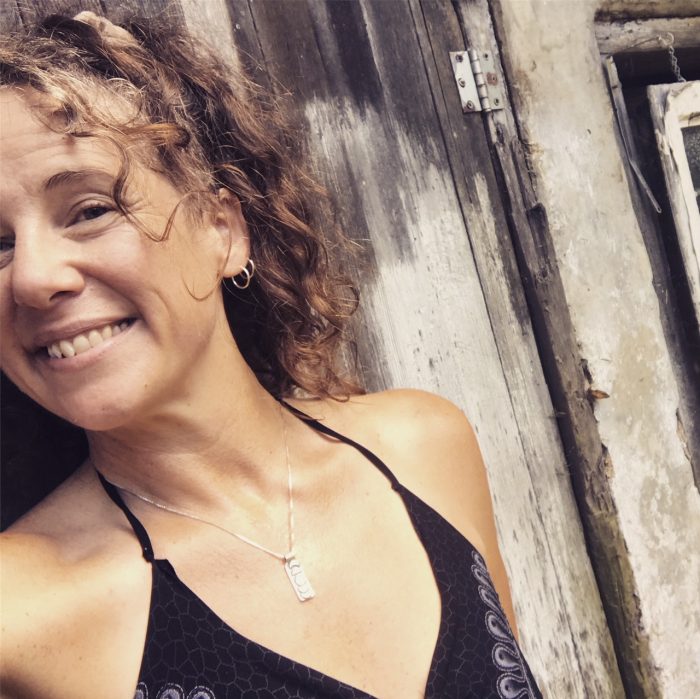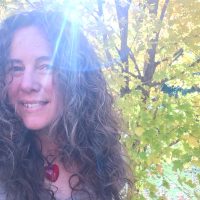My summer solstice plans to celebrate the longest day of the year took a shocking U-turn.
It went from paddling, camping, and pagan fires to ambulance rides and helicopter flights searching for doctors who could save my life. Three months later, I am still attempting to decipher the hidden treasures from the experience—what I should learn and how to proceed in life with my bonus time. What should I do with the extra icing?
While I clearly understood that my brain was bleeding out into my skull after a spontaneous arterial rupture, I never once thought of the outcome being death. Perhaps there is something valuable to this Buddhist method: “Do not dwell in the past, do not dream of the future, concentrate on mindfulness of the present moment.”
I was the only one not waiting for word that Bettina (that’s me) didn’t make it. I didn’t know dying was an option. I only thought about how I could get through this minute, which was the most beautiful lesson for me to hold. That’s what I’ve been sticking with since returning home to a life that now seems so foreign.
People keep asking me what I learned from this. They say things meant to comfort me, like, “Clearly, you aren’t done here and have something important to accomplish.” Frankly, that feels like a riddle that I may not be able to solve.
My sweet friend Michelle wisely told me that the pressure of doing something “meaningful” with your life, to honor the gift of survival, can cause a lifetime of anxiety. It’s better just knowing that you got to stay because of who you already are, and how you are already showing up in the world. So I’ve begun celebrating each fantastic moment with even more zest.
I am loving harder; I am dropping the inclination to downplay how much fun I’m having; I am getting better; I am pushing away the clinging anxiety that wakes me in the night.
Here is how the whole thing happened:
I woke up excited to be on the river. I was with my besties and a man I accidentally met who shook me despite my recent casual approach to relationships. (I was stuck in a pattern of breaking my own heart.) I hopped excitedly downstairs, wishing my 17-year-old a good morning, before slipping back beneath the covers waiting on the coffee.
That’s when the fierce pain hit me in the base of my skull. Instantly, it was fanning over my head in a thunderclap headache, rendering me to the floor in a convulsing, puking mess. My dismal medical experience and Wilderness First Responder training led me to believe I needed immediate help.
My attempts to text friends to cancel the day’s plans were cryptic. They assumed it was my 89-year-old father having an emergency. My teenager wasn’t responding to my cries for help. I tried 911, but could not recognize the numbers. My son finally sauntered casually into my bedroom, and I begged him to drive me to the emergency room.
The searing pain prevented me from standing, so I slid downstairs, crawled across cobblestones to the driveway, my body wracked in fluid-spraying heaves from every orifice. I sprawled across the back seat, shivering violently.
Emergency room docs diagnosed me after a head CT and loaded me into an ambulance to the next hospital where doctors would attempt to stop the bleed through an angiogram. The burst was in a rare spot, far into my frontal lobe, just out of reach. By the end of the longest day of the year, I was on board a helicopter heading for UNC-Chapel Hill Medical Center. Not quite the solstice fire that I had planned.
I awoke from surgery with a bloody drain hanging out of my head, a six-inch sutured gash, a black eye, still in pain, and a smiling girlfriend in pink fairy wings. Suddenly I felt like the survivor of a rough night and looked around for an empty bourbon bottle.
For days I watched the clock for the next pain meds and was trapped in a bed that screamed alarms when I tried to escape. Jodi arrived to rub my head, wash my hair, feed me food that I immediately vomited, and be my advocate and rock.
My friends rallied around my family back in Asheville, taking care of my children and papa, Biz even cutting papa’s awful toenails and bringing him stolen roadside flowers and groceries. The village I have spent 51 years creating was taking care of me and mine.
I could not think about tomorrow or what came next. I could only breathe through this moment, right here. Present.
Each day I worked toward strength. I read dismal research on aneurysms, saying that 50 percent of patients die before making it to the hospital. Of the 50 percent remaining, only 16 percent will be unscathed (without stroke symptoms).
I stopped reading. In this present moment, I was healing. I shriveled in the bed without exercise and food for two weeks. When my ex retrieved me, the past was suddenly dropped. It was more important for us to be team players in the present.
When he pulled up and gathered me in his arms, I suddenly realized that I had been through something big—I cried. I had been approaching each day wondering how to deal with the right now. I could not think of tomorrow; I could not think about my future quality of life.
Present. I was still making it through the day while trying to quell the fear. All I knew was that I desperately needed to see my boys and help papa understand what happened to me. Friends needed explanations and time with me, but boundaries were more important to protect my survival.
Once home, I staggered slowly across those cobblestones, evidence of my vomit washed away. My baby boy burst out of the front door, where we squeezed each other with all of our strength. I took his beautiful face in my hands to look into his eyes; it was the exact same intensity and love that I felt the first moment that I met him after the doctors surgically removed him from me. He was a survivor too.
I posted up on the back porch to be present in my healing—trying so hard not to have any expectations. This became my mantra. Not, “What should I plan next?” Or, “Will I be as strong as I have always been?” My mantra was: how can we all be happy with each other, and look at how the sun is shining against the hummingbird as it sits on the feeder. I pushed away thoughts like, “What if this thing in my brain blows again?”
Then, a new Bettina emerged. She began falling in love, where the old Bettina had left off trying to believe that she would never really belong with anybody.
But suddenly, love felt different too. More real. More necessary. More worth it.
Months later, I am continuing to unravel what happened. I realize this will take a long time, especially with a trauma brain that is overly emotional, forgetful, easily overstimulated, easily triggered (and people watching can’t really see anything different or wrong).
I am not the same. I am a physically weakened, but mentally strengthened version. I am just getting to know my new self. She has the same powerful experiences and the same fire in her soul to keep thriving, but she is more present, and her love is more powerful.
She understands her worth more clearly.
She has gained confidence in setting healthy boundaries for survival, bringing sweet love into where it is deserved, and she is happy to forgive—even those who can’t forgive her.








Read 12 comments and reply